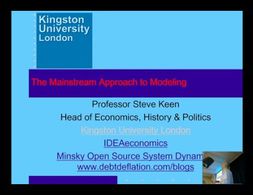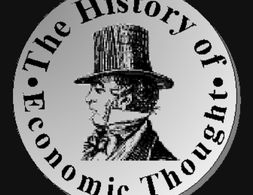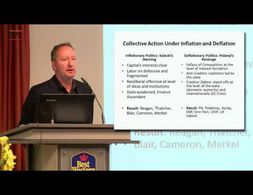✕
224 results
Renowned scholars elaborate a critique on neoclassical economics and how it was unable to predict and even favoured the financial crisis. They refer to DSGE models, equilibrium theory and rational agents – a brief insight in the critique on neoclassic economics.
Sheila Dow discusses the concept of radical uncertainty and the failure of neoclassical economics to integrate it into its analysis. As to the implications for financial regulation that arise from the presence of radical uncertainty she argues for institutional overhaul, where the banks see themselves as a licensed partner of the central bank and where rules, values, and conventions would be subject to a cultural shift. Also, Sheila Dow advocates for a renewed focus on retail banking.
Stratification economics is defined as a systemic and empirically grounded approach to addressing intergroup inequality. Stratification economics integrates economics, sociology and social psychology to distinctively analyze inequality across groups that are socially differentiated, be it by race, ethnicity, gender, caste, sexuality, religion or any other social differentiation.
The concept of financialisation has undergone a similar career as ‘globalisation’, ‘neoliberalism’ or even ‘capitalism’, in the course of which it changed from the explanandum to the explanans; the process of financialisation is taken for granted, while the concrete historical and empirical causal conditions of its realisation and perpetuation are being moved into the background.
In this radio interview, Andrew Sayer first outlines some features of neoliberalism and policies that are associated with it. Then a difference between wealth creation via investment and wealth extraction by means of lending money to those deprived of it or by acquiring property such as real estate or financial assets on the secondary market as absentee owner is established. In this context reference is made to J.A. Hobson's concept of "improperty." Finally, there are some words on the power dynamics associated with capitalism and its relation to climate change.
In this radio interview, Philip Mirowski, author of the book "Never Let a Serious Crisis Go to Waste" presents several differences between neoclassical economics and neoliberalism. Apart from a historical outline, Mirowski primarily discusses different perceptions of markets and the role of the state. Mirowski further reflects on the role think tanks ("part of the "neoliberal thought collective") and the entrepreneurial self (the "neoliberal agent") in the spreading and fostering of the neoliberalism.
In this lecture Mirowski claims that a good critique of and alternative to neoclassical economics should focus on microeconomics. In addition, he claims that mainstream economics is not about a specific "human nature", instead the understanding of markets (partially based on Hayek) is of special importance. As an alternative Mirowski proposes institutionalist economics that builds upon how markets work nowadays (e.g. links to computer science).
Keen first compares neoclassical approaches to modelling with heterodox ones. Then he discusses in length the required assumptions and the inconsistencies of the aggregate demand and supply model, which is extrapolated from a micro perspective. At the end some dynamic models with feedback mechanisms are shown.
This article outlines the fundamental challenges of democratically planned economies and categorises proposed models into six groups, each of which approaches planning and coordination at different levels of authority and between myriad economic units in a particular way, taking into account efficiency as well as democratic principles and environmental and social sustainability. Through a classification system based on decision-making authority and mediation mechanisms, the article provides a framework for understanding and comparing these models. By examining their different approaches, it offers insights into the complexities and potential paths of democratically planned economies in the 21st century.
This essay suggests to bring together two aspects of economic thought which so far have developed largely separately: degrowth and feminist economics. In this strive, the concept of care work and its role in feminist economics will be introduced and the downsides of the commodification of care work will be discussed. Subsequently, contributions to the discussion on the (re)valuation of care work will be taken into account.
The website contains a vast amount of information on the history of economic thought. It presents thinkers, their main works (and links to those works) and schools of thought which are sorted by political economy schools, neoclassical schools, alternative schools as well as thematic schools.
Mark Blyth criticises the political inability to solve the persistent economic crisis in Europe against the background of a deflationary environment. Ideological blockades and impotent institutions are the mutually reinforcing causes of European stagnation. The deeper roots lie in the structural change of the economic system since the 1980s, when neoliberalism emerged as hegemonic ideology. This ideology prepared the ground for austerity and resulting deflationary pressures and a strategy of all seeking to export their way out of trouble. Worryingly this is breeding populist and nationalist resentments in Europe.
Irene van Staveren, professor of pluralist development economics, presents her pluralist teaching method for the introductory level. Based on her textbook “Economics After the Crisis: An Introduction to Economics from a Pluralist and Global Perspective” she suggests to focus on real-world problems and pari passu apply economic theories such as Social economics, Institutional economics, Post-Keynesian economics as well as Neoclassical economics without wasting time to single out the latter. Besides pointing out advantages of such a pluralist method Irene illustrates her approach based on interesting topics such as growth or feminist economics.
In this short video behavioural economist, Dan Aerily talks about how our cognitive illusions will trick us into believing something that is otherwise deemed irrational by the homo economicus. It raises and probes into some very interesting questions that defy the neoclassical rational behaviour.
As seen with the United Nations significant promotion of the Sustainable Development Goals (SDGs) in the past few years, the issue of global development is of growing concern to many international organizations. As humanity continues to become more interconnected through globalization, the inequalities and injustices experienced by inhabitants of impacted countries becomes increasingly clear. While this issue can be observed in the papers of different types (e.g., different schools of thought) of economists throughout the world, the work of behavioral and complexity economists offer a unique, collaborative perspective on how to frame decisions for individuals in a way that can positively reverberate throughout society and throughout time.
Economics is dogmatic, monolithic, merely quantitative, highly normative, strongly political, primarily ethical, pseudo-scientific, and manipulative.
In her short contribution, the author questions how the value of goods and services is shaped in current neoclassical teaching. She criticizes the principle of pricing based on marginal income. She discusses what can be called wealth generating, what kind of wealth we need and points out a lack of a value theory.
Banner and Pastor debunk granted assumptions of the neoclassical theory, such as self-interested human behavior, the necessity of inequality and growth, to pull the threads between the new possible foundations of our society, "prosperity, security and community".
In this podcast, Professor Darrick Hamilton critically discusses how current neoliberal economic models uphold a systemically racially unjust structure of economies.
Most mainstream neoclassical economists completely failed to anticipate the crisis which broke in 2007 and 2008. There is however a long tradition of economic analysis which emphasises how growth in a capitalist economy leads to an accumulation of tensions and results in periodic crises. This paper first reviews the work of Karl Marx who was one of the first writers to incorporate an analysis of periodic crisis in his analysis of capitalist accumulation. The paper then considers the approach of various subsequent Marxian writers, most of whom locate periodic cyclical crises within the framework of longer-term phases of capitalist development, the most recent of which is generally seen as having begun in the 1980s. The paper also looks at the analyses of Thorstein Veblen and Wesley Claire Mitchell, two US institutionalist economists who stressed the role of finance and its contribution to generating periodic crises, and the Italian Circuitist writers who stress the problematic challenge of ensuring that bank advances to productive enterprises can successfully be repaid.
In this essay the author reviews empirical studies in economics that analyze factors behind the rise of nationalist and populist parties in Western countries. He stresses that economic factors (e.g., trade shocks and economic crisis) play a crucial role in the rise of populist parties; however, the discussion of mechanisms driving this trend remains unsatisfying
With the onset of an economic crisis that has been universally acknowledged since the end of March, two main questions arise: To what extent is the corona pandemic the starting point (or even the cause) of this crisis? And secondly: can the aid programmes that have been adopted prevent a deep and prolonged recession?
This text summarizes the content of the 2018 Nobel Prize winner W. Nordhaus. It is extended by some critical perspectives on this topic. The short dossier gives an overview of the most important texts we have read in the climate economics reading group.
The Great Recession 2.0 is unfolding before our very eyes. It is still in its early phase. But dynamics have been set in motion that are not easily stopped, or even slowed. If the virus effect were resolved by early summer—as some politicians wishfully believe—the economic dynamics set in motion would still continue. The US and global economies have been seriously ‘wounded’ and will not recover easily or soon. Those who believe it will be a ‘V-shape’ recovery are deluding themselves. Economists among them should know better but are among the most confused. They only need to look at historical parallels to convince themselves otherwise.
Since the 1980s, the financial sector and its role have increased significantly. This development is often referred to as financialization. Authors working in the heterodox tradition have raised the question whether the changing role of finance manifests a new era in the history of capitalism. The present article first provides some general discussion on the term financialization and presents some stylized facts which highlight the rise of finance. Then, it proceeds by briefly reviewing the main arguments in the Marxian framework that proposedly lead to crisis. Next, two schools of thought in the Marxian tradition are reviewed which consider financialization as the latest stage of capitalism. They highlight the contradictions imposed by financialization that disrupt the growth process and also stress the fragilities imposed by the new growth regime. The two approaches introduced here are the Social Structure of Accumulation Theory and Monthly Review School. The subsequent part proceeds with the Post-Keynesian theory, first introducing potential destabilizing factors before discussing financialization and the finance-led growth regime. The last section provides a comparative summary. While the basic narrative in all approaches considered here is quite similar, major differences stem from the relationship between neoliberalism and financialization and, moreover, from the question of whether financialization can be considered cause or effect.
The core of Georgism is a policy known as the Land Value Tax (LVT), a policy which Georgists claim will solve many of society and the economy’s ills. Georgism is an interesting school of thought because it has the twin properties that (1) despite a cult following, few people in either mainstream or (non-Georgist) heterodox economics pay it much heed; (2) despite not paying it much heed, both mainstream and heterodox economists largely tend to agree with Georgists. I will focus on the potential benefits Georgists argue an LVT will bring and see if they are borne out empirically. But I will begin by giving a nod to the compelling theoretical and ethical dimensions of George’s analysis, which are impossible to ignore.
Podcast series with six 12-minute parts introducing the the values and ideas behind our neoliberal economic system: where it came from, how it spread, and how we could do things differently.
In spite of the manifold critique about the state of economics in the aftermath of the financial crisis, an even increasing presence of economists and economic experts can be observed in the public sphere during the last years. On the one hand this reflects the still dominant position of economics in the social sciences as well as the sometimes ignorant attitude of economists towards findings of other social sciences. On the other hand this paper shows that the public debate on politico-economic issues among economists is dominated by a specific subgroup of economists, tightly connected to an institutional network of “German neoliberalism”. This group of “public economists” (i) is dominant in public debates even after the financial crisis, (ii) reproduces the formative German economic imaginary of the Social Market Economy in a German neoliberal interpretation and (iii) has a good access to German economic policymaking, rooted in a long history of economic policy advice.
Marx’s theory of the falling rate of profit is not only empirically borne out, but the theory he proposed seems to describe accurately how that happens. Furthermore, the whole process is useful for understanding the history of contemporary capitalism.
Michael Kalecki famously remarked “I have found out what economics is; it is the science of confusing stocks with flows”. Stock-Flow Consistent (SFC) models were developed precisely to address this kind of confusion. The basic intuition of SFC models is that the economy is built up as a set of intersecting balance sheets, where transactions between entities are called flows and the value of the assets/liabilities they hold are called stocks. Wages are a flow; bank deposits are a stock, and confusing the two directly is a category error. In this edition of the pluralist showcase I will first describe the logic of SFC models – which is worth exploring in depth – before discussing empirical calibration and applications of the models. Warning that there is a little more maths in this post than usual (i.e. some), but you should be able to skip those parts and still easily get the picture.
What influence do changes in tax policy or state decisions on expenditure have on economic growth? For decades, this question has been controversially debated.
Industrial policy has been a central part of policy prescription by many heterodox schools arguably since mercantilism, but the theories behind it and types of policy advocated for have evolved over time. Recently some neoclassical economists have shown renewed interest in it, but is this mainstream acceptance a step back or a step forward from earlier heterodox ideas?
We use cookies on our website. Click on Accept to help us to make Exploring Economics constantly better!






























